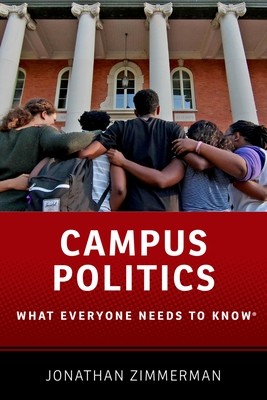
- We will send in 10–14 business days.
- Author: Jonathan Zimmerman
- Publisher: Oxford University Press, USA
- ISBN-10: 0190627409
- ISBN-13: 9780190627409
- Format: 13.7 x 20.6 x 1.3 cm, softcover
- Language: English
- SAVE -10% with code: EXTRA
Reviews
Description
Universities are usually considered bastions of the free exchange of ideas, but a recent tide of demonstrations across college campuses has called this belief into question, and with serious consequences. Such a wave of protests hasn't been seen since the campus free speech demonstrations of the 1960s, yet this time it is the political Left, rather than the political Right, calling for restrictions on campus speech and freedom. And, as Jonathan Zimmerman suggests, recent campus controversies have pitted free speech against social justice ideals.
The language of trauma--and, more generally, of psychology--has come to dominate campus politics, marking another important departure from prior eras. This trend reflects an increased awareness of mental health in American society writ large. But it has also tended to dampen exchange and discussion on our campuses, where faculty and students self-censor for fear of insulting or offending someone else. Or they attack each other in periodic bursts of invective, which run counter to the "civility" promised by new speech and conduct codes. In Campus Politics: What Everyone Needs to Know(R), Jonathan Zimmerman breaks down the dynamics of what is actually driving this recent wave of discontent. After setting recent events in the context of the last half-century of free speech campus movements, Zimmerman looks at the political beliefs of the US professorate and students. He follows this with chapters on political correctness; debates over the contested curriculum; admissions, faculty hires, and affirmative action; policing students; academic freedom and censorship; in loco parentis administration; and the psychology behind demands for "trigger warnings" and "safe spaces." He concludes with the question of how to best balance the goals of social and racial justice with the commitment to free speech.EXTRA 10 % discount with code: EXTRA
The promotion ends in 18d.08:50:26
The discount code is valid when purchasing from 10 €. Discounts do not stack.
- Author: Jonathan Zimmerman
- Publisher: Oxford University Press, USA
- ISBN-10: 0190627409
- ISBN-13: 9780190627409
- Format: 13.7 x 20.6 x 1.3 cm, softcover
- Language: English English
Universities are usually considered bastions of the free exchange of ideas, but a recent tide of demonstrations across college campuses has called this belief into question, and with serious consequences. Such a wave of protests hasn't been seen since the campus free speech demonstrations of the 1960s, yet this time it is the political Left, rather than the political Right, calling for restrictions on campus speech and freedom. And, as Jonathan Zimmerman suggests, recent campus controversies have pitted free speech against social justice ideals.
The language of trauma--and, more generally, of psychology--has come to dominate campus politics, marking another important departure from prior eras. This trend reflects an increased awareness of mental health in American society writ large. But it has also tended to dampen exchange and discussion on our campuses, where faculty and students self-censor for fear of insulting or offending someone else. Or they attack each other in periodic bursts of invective, which run counter to the "civility" promised by new speech and conduct codes. In Campus Politics: What Everyone Needs to Know(R), Jonathan Zimmerman breaks down the dynamics of what is actually driving this recent wave of discontent. After setting recent events in the context of the last half-century of free speech campus movements, Zimmerman looks at the political beliefs of the US professorate and students. He follows this with chapters on political correctness; debates over the contested curriculum; admissions, faculty hires, and affirmative action; policing students; academic freedom and censorship; in loco parentis administration; and the psychology behind demands for "trigger warnings" and "safe spaces." He concludes with the question of how to best balance the goals of social and racial justice with the commitment to free speech.

Reviews